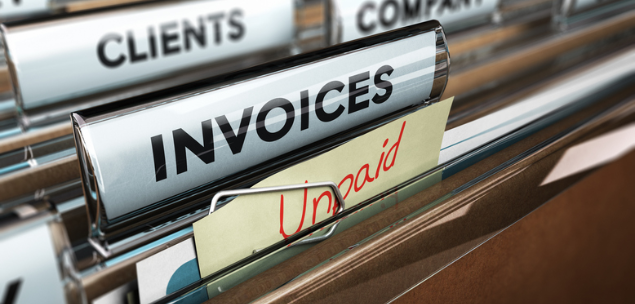SMEs are vulnerable to late payers in Australia, with Small Business Ombudsman Kate Carnell stating, in April, that larger organisations are using them as a “cheap form of finance”, restricting their growth and causing solvency issues.
From calls for legislation to the introduction of a voluntary code to deter late payments, late payments have never been a hotter topic, and for a good reason – around one in two small businesses are owed more than $20,000 in late payments*.
As part of our latest “Let’s Talk…” article, centering on Late Payments, we put the following question to more than a dozen entrepreneurs and industry experts: “What mistakes do SMEs make when dealing with late payers?”
Some of the responses included failing to implement an invoice management strategy, being too lenient (or too aggressive) with late payers, neglecting to include crystal-clear payment terms and conditions in invoices/contracts, failing to chase up late payments straight away, not training customers to pay on time, and refusing to draw a line in the sand.
In addition to calling out some common mistakes, this week’s lineup of “Let’s Talk…” commentators also provided hot tips and actionable insights to help small businesses maintain a healthy cash flow.
“What mistakes do SMEs make when dealing with late payers?”
Tom Amos, CEO & Co-Founder of Sidekicker, Certified Practicing Accountant: “The single biggest mistake a business can make is not having an enforced debtor strategy that has effective reactive and proactive plans.
“A reactive plan must enforce processes that support immediate action when an invoice is not paid on time. Major mistakes in reactive action include letting a junior handle the conversation and sending an email instead of picking up the phone. A phone call should be made within 24 hours by a senior in the business who is able to exercise control in an uncomfortable situation.
“Some businesses forget to proactively plan for late payers all together. Closely monitor your debtors to spot slow payment behaviours so you can implement proactive tactics such as automated payment reminders. Don’t make the mistake of reinvesting into your company before having cash reserves that will support the business for 3-6 months in case you run into a string of late payments and try to avoid sacrificing cash flow policy for the seduction of landing a big client unwilling to commit to reasonable payment terms.”
Sam Allert, Managing Director, Reckon: “Small businesses are often in a fragile position when it comes to late payments. Cash flow pressures are higher and the need to maintain and satisfy a slimmer customer base are equally as high. So how do you safeguard yourself?
“Firstly, mistakes involve not credit checking your clients, not clearly stating payment terms, allowing service to continue after several missed payments, however a good billing process is key to reducing the phenomenon of late payments.
“Don’t be reactive – instead, devise a plan of emails, phone calls, letters and a strict schedule of these events to be applied to every invoice – all becoming more urgent and frequent as the lateness accumulates. Many SMEs avoid ‘irritating’ their customers… and pay the price for their passive approach. Be assertive but, of course, never aggressive.
“Online invoicing solutions also greatly assist, by allowing your business to bill instantly and securely, fast tracking the process once the job is complete. Leading small business invoicing solutions also have in built tracking tools, to assist in tracking your payments, alerting the need to follow up on late payments.”
Colin Porter, Founder & Managing Director, CreditorWatch: “One of the biggest mistakes, but also the simplest to rectify, is not having simple processes and procedures in place that streamline your receivables communication with your clients. There are many affordable, and even free tools that let you generate invoices and statements as well as automated reminders to follow up your accounts the moment they become overdue.
“Training your customers to pay on time with consistent reminders lowers the chance of dealing with late payers. Whilst sometimes it’s inevitable that you have to deal with a late payer, it’s important that you immediately check in with them to find out their reason and work with them by creating a payment arrangement. Keeping all of your correspondence, such as payment requests and final demands in writing is helpful if ever you need to take the matter to a debt collector or to court.”
Anneliese Urquhart, Small Business Director, Xero: “The simple answer? Small businesses don’t chase payments. It sounds silly but many businesses can’t find the time or don’t know the right way to do so. The Xero Small Business Insights Report found average payment times are falling slightly, which is great, but remain 36 days late on average.
“Often late payments are simply result of business owners not following up. It shouldn’t take long to do — you can set up automated reminders for late payments after a certain date, and by providing clients a few payment options you can significantly increase the chances of being paid on time. By keeping on top of accounts, small businesses can ensure they keep their cash flow healthy, and don’t go months without precious revenue.”
Rob Hango-zada, Co-Founder and joint-CEO, Shippit.com: “I think one of the biggest mistakes is putting too much trust and faith into a commercial relationship. Compared with larger enterprises, SMEs are always more lenient as they are hungry for growth and are able to have more of a personalised relationship with their customer.
“When Shippit launched, we tried our best to give prospects every reason to use us; we extended credit without correctly evaluating the credit risk of each prospect. We got burned by trusting some of our clients too much – some asked for an extension of credit a week at a time until they stopped responding to emails. We have since taken a more controlled creditor strategy to reduce exposure to late payers and whilst this doesn’t mean we can work with everyone, it means that those we do work with, it’s for the long term and mutual success of both our companies.”
Tanya Titman, Founder, Acceler8 & Accountant: It is not unusual to find SMEs with payment terms of 14 days waiting an average of 50-55 days to receive payment from their customers. This has a significant impact on the businesses cashflow. My top tips for avoiding late payments are:
- It’s important the business owner (not bookkeeper or accountant) reviews their ‘debtor days’ every month.
- If your terms are 14 days – send statements twice a month. If you invoiced a customer on the 1st of the month, that invoice falls due on 15th month. Don’t wait until the 30th to remind customers they owe you money.
- Make it easy for customers to pay you. Xero Accounting Software sends invoices with a Pay Now button which makes it simple to pay the bill.
- Write off old debts (as they’re skewing your data and are unlikely to be paid).
Arjun (AJ) Singh, Co-founder & Managing Director, ezyCollect: “Often the most common mistakes are the simplest, I’ve found that many SME owners neglect to set up a clear invoice management strategy from the get go. It pays to include payment terms and conditions in your contracts and invoices, and training your sales staff on your payments policy means they can establish your payment expectations upfront. This sets up a safeguard should legal action be required down the track, and also means your modus operandi is to issue a reminder, not a reprimand, assisting your business’ client relations.
“Other frequent mistakes include: delaying sending the first reminder; writing invoice reminders in anger or haste; misrepresenting legal action and introducing penalties without previous contractual agreement; using only one channel to reach debtors; relying on one reminder; giving up without exploring alternative avenues; and finally, not acknowledging payment. After all is said and done, a lot of SMEs overlook saying thank you. Though it seems simple, it is a hugely powerful way of reinforcing your client’s payment behaviour.”
Abhinov Gulati, Director, Ganemo Group: “A key mistake is not having at least a 3-month runway to survive without getting paid. To avoid late payments, send invoices at a ‘high point of satisfaction’ like when a project milestone is achieved. If payments are late, try to understand the reasons for it. If a client has cashflow problems, offer an extension or split the payments. If they can’t pay, you may have to slow down future deliverables.
“You need to be very frank and upfront with them, and explain it’s important for your cash flow. Always try to maintain a good relationship, and/or use a “good cop/bad cop” approach. Your business partner should ultimately be responsible and may have to play hardball so you can keep your direct engagement with them more cordial. SMEs MUST have at least a 3-month runway to survive without getting paid or lose the ability to be flexible or compassionate for genuine clients going through hardship.”
Karen Taylor-Brown, CEO, Refraction Media: “A mistake SMBs make is being too patient. It’s important to always keep your cool and make sure you don’t damage your relationship with your client, but you need to get onto overdue invoices quickly.
“When you’re dealing with large organisations, you might discover that your invoice has been sitting, ignored, in an Inbox because it’s missing a key piece of information. A purchase order number, a client code, a supplier application form. Get onto this early and you’ll get your invoice on the processing conveyer belt quicker. Remember – it’s your money!
“It’s also beneficial to understand how your client processes invoices and make sure you do it – to the letter. Some clients have online uploading systems, others want the invoice to go directly to Accounts Payable. Whatever the system, follow it, and you’ll encounter fewer hurdles and the money will be in your account quicker.”
Brett Shanley, Co-founder & CEO, Study Loans: “Late payers can be frustrating for all organisations regardless of their size. But, as we all know, it’s a fact of life that not everyone pays on time. For SMEs this can be especially frustrating because of cash flow implications. We try to send text message and email reminders to customers when their payments are due or late, as do certain other financial institutions. Ultimately, we believe communication is key to keeping debt down but sometimes a little bit of leeway goes a long way. At the end of the day, a long-term relationship with the customer is most important.”
Leigh Dunsford, Co-founder, Waddle: “Business owners don’t often draw a line in the sand, they continue to deliver products or services to late payers, further reinforcing bad habits. Temporarily ceasing products or services can communicate that it’s not OK to pay out of terms.”
“SMEs need to first establish credit accounts for each new customer and assign a credit limit clearly outlining the terms of how the relationship will operate. From the outset, quality customers respect boundaries that are put in place. Customers that do not respect your trading terms will almost always end up costing you more in non-payment than the profits you would have booked from sales.
“It’s important to understand the damage the flow on effect from late payments has, from outlaying cash upfront to suppliers, staff and operational costs. More often that not, you will make more money from not selling to bad payers.”
Stuart Zalunardo, Head of SME Banking, St George Business Bank: “The majority of business owners know all too well the struggles and stress caused by late payments. While it is important for SMEs to collect late payments as soon as they can, it’s also important to have a look at the business’s entire credit process. Businesses can look to offer discounts to customers who pay their invoices early or apply additional late payment charges to those who don’t. It’s also critical to offer a variety of payment options, making it easy for customers to pay, such as direct debit/credit, accepting credit card payments or BPay.
“Don’t underestimate the value of a good accounting and debtor management system, particularly one that can alert business owners when an invoice is soon-to-be due. This can ensure follow up is carried out before the payment is late. If an invoice does become late, follow up non-payment the day after the invoice is due by telephone, as email rarely works.
“And finally, be persistent. SMEs cannot always prevent late payments, but if the credit process is done well businesses may be able to limit the impact.”
Victoria McKeown, General Manager (Brand & Operations), Atomic 212: “Coming from the marketing industry, I have been shown time and time again that having an intimate knowledge of your customer is invaluable when trying to get your message across. In this case, the message is simple: pay on time.
“Regardless of the size of your customer or client, it pays dividends to know how they work. SMEs often overlook the importance of knowledge when it comes to their relationships with their clients. Each customer or client will have different processes, patterns, preferences and payment history, and this information can be extremely important in not just dealing with late payments, but also avoiding them.
“SMEs can then prepare for slower paying clients or if needed can tailor their invoices to specific customers. It can be as simple as giving advanced notice if they need an internal PO (Purchase Order). Although it can mean increased workload, you can ensure invoices comply with the client’s processes or systems.”
Sharon Nouh, CEO, Expense Manager & Portfolio CEO, Heads Over Heels: “In the automation age, SMEs should be looking at how technology can be used to speed up the raising of invoices and the payment. Using electronic invoicing and payment solutions means the invoice gets to the client quicker, it’s more correct (and paper free) and easy to follow up. Some large suppliers will even offer 14 days terms if it’s an electronic invoice.
“But a common mistake SMEs have with their clients is not being specific about payment terms and options. Offering clients the ability to use solutions like PayDirect Online is a great option for SMEs. Get your clients used to paying the invoice immediately by using a credit card and then you can use expense management software for the automatic payment card reconciliation. Accounts Payable & Accounts Receivable totally automated and paper free!”
* http://www.asbfeo.gov.au/news/small-biz-should-never-be-a-bank-for-big-biz
About “Let’s Talk…”
This exciting new, weekly initiative provides entrepreneurs and industry experts with a forum to share rapid-fire views on a range of issues that matter to start-ups and SMEs. Every Wednesday, we pose a themed question to a line-up of knowledgable industry figures, with a view to picking their brains for valuable insights to share with you, our readers.



